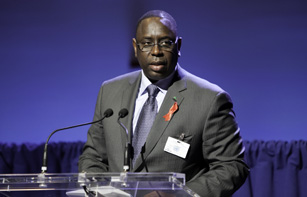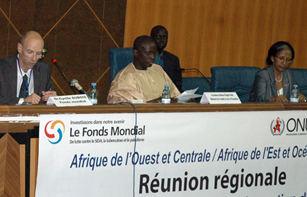
President of Senegal Macky Sall at Shared Responsibility & Global Solidarity event at UN Headquarters, NYC, on September 26, 2012.
Credit: UNAIDS/B.Hamilton
With new leadership and bold commitments, the Senegal has continued the success of its national AIDS response, keeping HIV prevalence low and earning the recognition of global partners for its progress and achievements.
“This is the time for Africa to intensify its efforts and create a new international compact against AIDS,” said President Macky Sall of Senegal at the recent high-level side event on Sourcing Sustainable Solutions for the AIDS response in Africa at the UN General-Assembly. “With the new vision of Shared Responsibility and Global Solidarity, the African’s Union’s Road Map has enabled Senegal to prioritize HIV prevention and plan to end HIV transmission from mother to child.” President Sall was one of the key African heads of state to join the Chairperson of the African Union, President Boni Yayi and US Secretary of State Hilary Clinton to address this side event that highlighted the AU’s Roadmap on Shared Responsibility and Global Solidarity for the AIDS, TB and malaria response in Africa.
At a recent meeting in Geneva, UNAIDS Executive Director Michel Sidibé also commended the work of Senegal’s National AIDS Council at a recent meeting with its Executive Secretary, Ibrahim N’Doye. During discussions on Senegal’s AIDS response, Dr N’Doye highlighted how political commitment contributed to the scale-up of HIV services in his country.
Under the leadership of President Macky Sall, the contribution of the Government of Senegal continues to increase steadily. The country has also called for greater transparency and initiated a resource tracking exercise with the assistance of UNAIDS aimed at maximizing AIDS investments and impact.
These efforts were recently backed by an audit by the Office of the Inspector General (OIG) of The Global Fund to Fight AIDS, TB and Malaria. Successful with its application for Phase 2 of an on-going HIV grant, Senegal will receive an additional US$ 33 million for the next three years. The renewed grant, approved by The Global Fund board on 24 September 2012, will contribute to financing the implementation of Senegal’s HIV National Strategic Plan.
HIV prevalence among the general population remains stable at 0.7%, while HIV prevalence among sex workers has decreased from 19.8% in 2006 to 18.5% in 2011 and new HIV infections among youth has decreased
UNAIDS
According to the Global Fund, Senegal has been a model for the HIV response in the West and Central Africa region with a portfolio of well-performing grants, mobilized in-country partners, and a vibrant civil society. The recent report from the OIG highlighted that overall, results in Senegal were encouragingly positive. The OIG was able to confirm that appropriate oversight arrangements had ensured that all grant funds were properly utilized and produced very good results.
The report from the OIG also provided concrete recommendations to both country partners (Country Coordinating Mechanism and Principal Recipients) as well as the Global Fund Secretariat in order to enhance accountability through a more holistic and integrated approach. These recommendations included the need to strengthen financial management capacity of sub-recipients and the need to improve drug management, distribution and storage.
The country has made major efforts in the past five years to scale-up access to HIV prevention, treatment, care and support for its population, with a focus on key populations at higher risk. It is one of the few countries in the West and Central Africa region, which has collected robust data on hard to reach populations such as sex workers, men who have sex with men and people who use drugs.
Scaling up HIV services

Dr Ibrahim N’Doye Executive Secretary, National AIDS Council of Senegal and UNAIDS Executive Director Michel Sidibé
The country has scaled up access to antiretroviral treatment (ART) substantially and treatment is now widely available in many parts of Senegal. The number of people receiving ART increased from 5500 in 2006 to 18 352 in 2011. Between 2006 and 2010, the number of sites offering voluntary counselling and testing also increased from 109 to 687 and reach the number of 1023 in 2011. The services to prevent transmission of HIV from mother to child were scaled-up from 404 in 2009 to 648 in 2010 and 976 in 2011.
Such combination of efforts is having positive results. According to UNAIDS, HIV prevalence among the general population remains stable at 0.7%, while HIV prevalence among sex workers has decreased from 19.8% in 2006 to 18.5% in 2011 and new HIV infections among youth has decreased.








